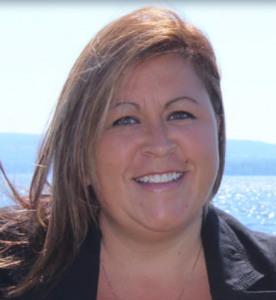Dnaagdawenmag Binnoojiiyag Child & Family Services to expand its reach as it takes on Indigenous CAS cases

By Sam Laskaris
HIAWATHA FIRST NATION – Amber Crowe has some rather mixed emotions.
Crowe is the executive director of the Dnaagdawenmag Binnoojiiyag Child & Family Services (DBCFS), which services 10 First Nations.
After more than a two-decade waiting process, the DBCFS recently received official designation from the provincial government to take over the Children’s Aid Society (CAS) Indigenous files from several other non-Indigenous groups.
Lisa MacLeod, the Minister of Children, Community and Social Services, made the announcement in late February that the DBCFS would finally receive its designation status.
That official provincial designation is what DBCFS officials have been seeking since 1998 to provide an Indigenous service model for the delivery of child and family services.
Since its formation, the DBCFS has been providing a number of other services including Native youth justice services, family services and assistance for child and youth mental health and addictions.
Crowe said the ministry designation to be able to provide care for Indigenous children in CAS care was bittersweet.
“While it’s a great accomplishment and we’re all very humbled, taking on this responsibility is huge,” she said.
In fact, the agency will have to double the amount of staff it has just to try to keep up with all of the additional workload it will have with CAS cases.
DBCFS currently employs about 150 people. Projections are the agency will require 300 staff members.
Crowe, who has been DBCFS’s executive director for the past four years, said a recruitment push has already begun.
“We are trying to keep our staff mostly Indigenous,” she said. “We’re having resumes coming in and we hope to be fully staffed up by Fall.”
DBCFS services are being offered to anyone who identifies as Indigenous, regardless of whether they are a member of a First Nation or have a status card.
“Many of our services are rooted in cultural principles,” Crowe said. “But we can provide services without that cultural lens if that is what is needed.”
Anishinabek Nation member First Nations that the DBCFS has in its coverage area are Chippewas of Georgina Island First Nation, Curve Lake First Nation, Mississaugas of Scugog Island First Nation, Alderville First Nation, Moose Deer Point First Nation and Beausoleil First Nation.
The agency’s coverage area also includes the Wahta Mohawks, Tungasuvvingat Inuit, Mohawks of the Bay of Quinte, and Hiawatha First Nation, which is the home of the DBCFS office that Crowe works out of.
DBCFS staff were not inundated all at once with all of the Indigenous CAS files that they will now be handling.
“We have to do it in very gradual planned stages,” Crowe said.
The transfer of files is expected to take nine weeks.
During the first week following the DBCFS’s designation, it only received Simcoe County cases. The following week, the Durham Region files were received. In ensuing weeks, files from Kawartha/Haliburton and Highland Shores agencies were to follow.
This process is to be repeated for the next four weeks and finally in the ninth week, all files from York Region will be transferred over.
“It’s definitely overwhelming to see the amount of our children in care,” said DBCFS’s executive assistant Kathryn Wilson, who has been with the agency for almost eight years now.
Like Crowe, Wilson had varying feelings on DBCFS’s designation announcement.
“It’s overwhelming and emotional,” she said. “It’s hard to believe the day has come, though we have always had the mandate from our community.”
A DBCFS designation celebration is scheduled for July 9-10, at a location that has yet to be determined.


